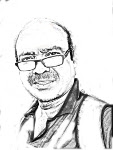Wildlife in a City Pond
1. When it rains, the barren pond bursts into life. It goes from being being dry and brown to blue and green. When an orchestra starts to play, the silence n the hall gets

filled with the beautiful music of different instruments. Similarly, when it rains, the dry barren pond gets filled with water, palnts and animals.
2. Free Response; Suggested Answer: Nature's dance-trees and reeds swaying in the wind; the flowing water is the music in the background; colourful birds flying around gracefully; fish leaping in the pond; animals playing with each other.
3. The speaker feels surprise, awe and wonder when he looks at Flapshell Pond.
4. The speaker was determined to save Flapshell Pond because it was beautiful and he loved it. Additionally, it was home to so many plants and animals; it would be a shame to destroy it.
5. When people threatened to destroy Flapshell Pond, the residents of the neighbourhood- the speaker, the children and other neighbours - got together to save it. They organized a protest and contacted various officials, including the city commissioner. Even people from environmental organizations got involved. Lots of people worked together as a united group to save the pond.
Comprehension
A. 1. When the speaker moved to a new house in Pune, he discovered that a loud noise started up when it turned dark.
2. In the summer, the pond was dry and lifeless.
3. The rains turned the lifeless, dry brown earth of the pond into a beautiful oasis of blue and green. It filled up with water and many plants sprouted up. Many different animals and birds flocked to it.
4. When the pond filled up with water, the speaker spotted Flapshell turtles. He learnt that the turtles slept under the ground during the dry summer and waited for the rains. so he named the pond after them.
5. The speaker called the pond a 'natural restaurant' because animals like the spot-billed ducks flew to the pond, hunted for some snails and water plants to eat, and then left to go back - almost like eating at a restaurant and going back home.
B. a. The speaker is comparing the life in the pond to an orchestra.
b. The 'orchestra' started playing because the monsoon rains arrived and the pond burst into life.
c. The speaker did not initially appreciate the music of the 'orchestra', but he soon grew to appreciate it and consider it a symphony.
2. a. 'He' is the city commissioner of Pune.
b. In the summer, Flapshell Pond was dry and lifeless. But come monsoon, it filled up with water. Many different types of plants started growing and many species of animals made it their home. All the animals together created a beautiful symphony of sounds during the day and night. Plant life and wildlife lived together in harmony and this was a wonderful sight to see. This was the 'monsoon magic' that the city commissioner experienced.
c. The city commissioner realized that Flapshell Pond was a wonder of nature and that it would be wrong to destroy it.
3. a. The speaker finds his backyard magical because that is where the Flapshell Pond is. He considers Flapshell Pond magical because it is full of the best things you can find in nature.
b. Free response
C. 1. The speaker was scared that Flapshell Pond would be drained and used as land for construction. if the speaker's fears came true, then the Pond would be destroyed. All the plants that grew in and around it would be dug out and cleared up to make space for the building. Once the pond and the plants are destroyed, there will no longer be a home for all the different birds and animals that visited the pond or lived in it. The residents of the area would no longer be able to enjoy the beauty of the wetland. The coolness creaed by the ponds and plants would be lost too. Overall, it would be a small disaster.
2. The speaker did not save the pond alone. It took the conbined effort of a lot of people to do so. The speaker organized a protest along with the children of the neighbourhood. He invited journalists to cover the event and write about it in newspapers. The residents of the neighbourhood called up officials to ask them for help saving the pond. Many environmental organizations also got involved in the efforts. The city commissioner was invited to have a look at the Flapshell Pond and experience its magic. All this worked and the pond was saved.
3. The speaker is a very observant person. He notices very minute details about the pond. He notices how it changes from season to season. He loves nature and wildlife and notices the different species of plants and animals in and around the pond. He even observes the behaviour of these animals in detail. He listens to the sounds and appreciates the natural symphony. He is very passionate about nature and conservation. When he hears that Flapshell Pond is to be destroyed, he does not stop until he has done everything he can to save it. He organizes protests and gets the entire neighbourhood together to save the pond. He is very dedicated person.
Please click here to know the answer of the previous chapters
छत्तीसगढ़ पाठ्य पुस्तक निगम के पुस्तकों के नोट्स के लिए नीचे लिंक पर क्लिक कीजिए
Labels: ClassVII










